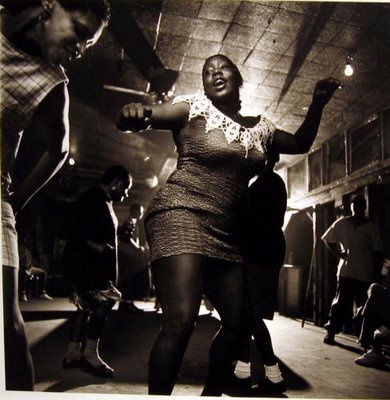Black and Proud?

by Robert Bell
The most important musician in modern rock and roll history has passed on, and it has been inspirational to see so many pay homage to the Godfather of Soul, James Brown. His legacy - of being one of the few entertainers who literally changed music - is only eclipsed by his determination to be black and proud, regardless of the odds. It will be interesting to see how our current crop of Negro leaders, professionals and fans carry on after brother Brown. If the past decade is any indication, the days of black radio and music reflecting the pride, excellence and resistance of African Americans are just about over. The black music industry is doing quite well financially, but despite its influence and purported power, black music is relegated to a subordinate position in terms of public perception and media exposure. Unfortunately, most Negroes accept this contemporary “Jim Crow” environment and passively or ignorantly allow their culture and music to be portrayed in whatever fashion the mainstream press deems fit.
I was recently told by a friend that a certain black female entertainer had formed a white rock band. When being interviewed by some media talking head, she stated that black folks had abandoned rock and roll. Now I’m not going to mention the entertainer’s name because I haven’t been able to verify the story. It’s interesting though because I was in a coffee shop the other day (black owned) and the two African-American employees were listening to a local white rock station. Moreover, a year or so ago, I read an article where a sister who is a musician was interviewed and commented on how so-called r & b music and rap were too restrictive for her.
All of this is quite disconcerting and it has been for several years now. So much so that I spent a considerable amount of time writing a book about the history and current state of popular music entitled, “The Myth of Rock and Roll: The Racial Politics of American Popular Music; 1945-2005”. What’s quite clear to me is that the idea of white supremacy is becoming ever more dominant in this country, and many black folks don’t realize it and are unwittingly contributing to the problem.
Despite the fact that black music and culture have been incredibly pervasive and indeed, dominant in terms of records sales, chart position, etcetera, the corporate media would have you believe that it’s the white rock genre that is on the cutting edge of the artistic world. And unfortunately, far too many believe it. Media consolidation, led and controlled by corporate elites has been the primary contributor to the ruse. But the indifference and apathy of African-American media business persons and professionals is also a major contributor. In their case, the problem starts with knowing and appreciating your history.
Without going into all the details, a simple review of rock history and where it all started can be done by looking at the so-called definitive rock and roll institution, the Rock and Roll Hall of Fame in Cleveland, Ohio. It’s there because of Alan Freed, a Jewish DJ who lived and worked there circa 1949 through 1954. He is reputed to have popularized the term rock and roll. But, just what was Freed playing on his legendary radio station in 1951? By Freed’s own admission, he was playing r & b – at least four years before Elvis and others would become famous.
Most music critics know this fact but over the years, particularly after the emergence of the Beatles (the British interpretation of the blues), the white media has commandeered the term rock and applied it to – whatever it wishes. White folks claiming ownership and superiority over something it neither owns nor creates is not new, but what is disturbing is how Negroes within the industry have so easily surrendered the nomenclature to the powers that be. In its place we have accepted the flaccid term – r & b – a term without origins in the black community. Rather, it was a lame substitute assigned by legendary Atlantic record executive, Jerry Wexler, for Billboard Magazine’s official term for black popular music – race music.
Not only has the Negro media establishment failed to claim its central role in rock history, but it is failing to raise the standard and consciousness of new generations of listeners and fans. Black radio is only a façade of what it once was (in the ‘70s) and as a result creates the impression, particularly with younger listeners, that black music is no longer on the cutting edge of music innovation. Black radio’s proclivity for narrowly formatted programs is becoming staid and boring – and in some cases downright ridiculous. Far too many inventive musicians who are playing brilliant forms of black music are being ignored by radio programmers, and the results will be incalculable. When once we could hear ‘What’s the Word from Johannesburg?”, on commercial radio, we are now overdosing with pop sludge. Radio segregates music styles ad naseum, and in periodicals and newspapers across the country, the media elite busies itself saluting music that hovers between garbage and so-so.
As the majority media was covering and saluting James Brown, it was a tragic irony that a black newscaster from MSNBC interviewed the editor of Rolling Stone magazine for his analysis on brother Brown’s career and significance. The world’s preeminent white rock magazine world never could find the space for James Brown on its cherished front cover during the height of his career (1967-1973). We will have heard many accolades and laudations about the one and only James Brown during the few weeks after his death. At a time when we need it most, will we ever hear “Say It Loud, I’m Black and I’m Proud” again on commercial radio?
Music for your thoughts:
http://www.zshare.net/audio/08-like-it-is-like-it-was-part-2-mp3-uff.html
http://www.zshare.net/audio/05-say-it-loud-im-black-and-im-proud-1-mp3.html

0 Comments:
Post a Comment
<< Home